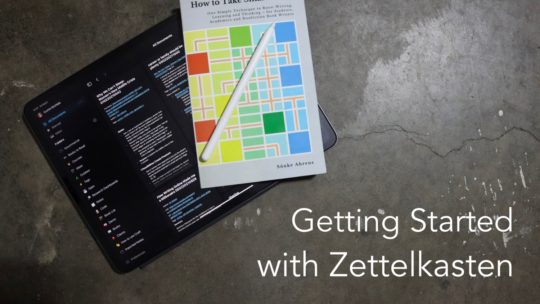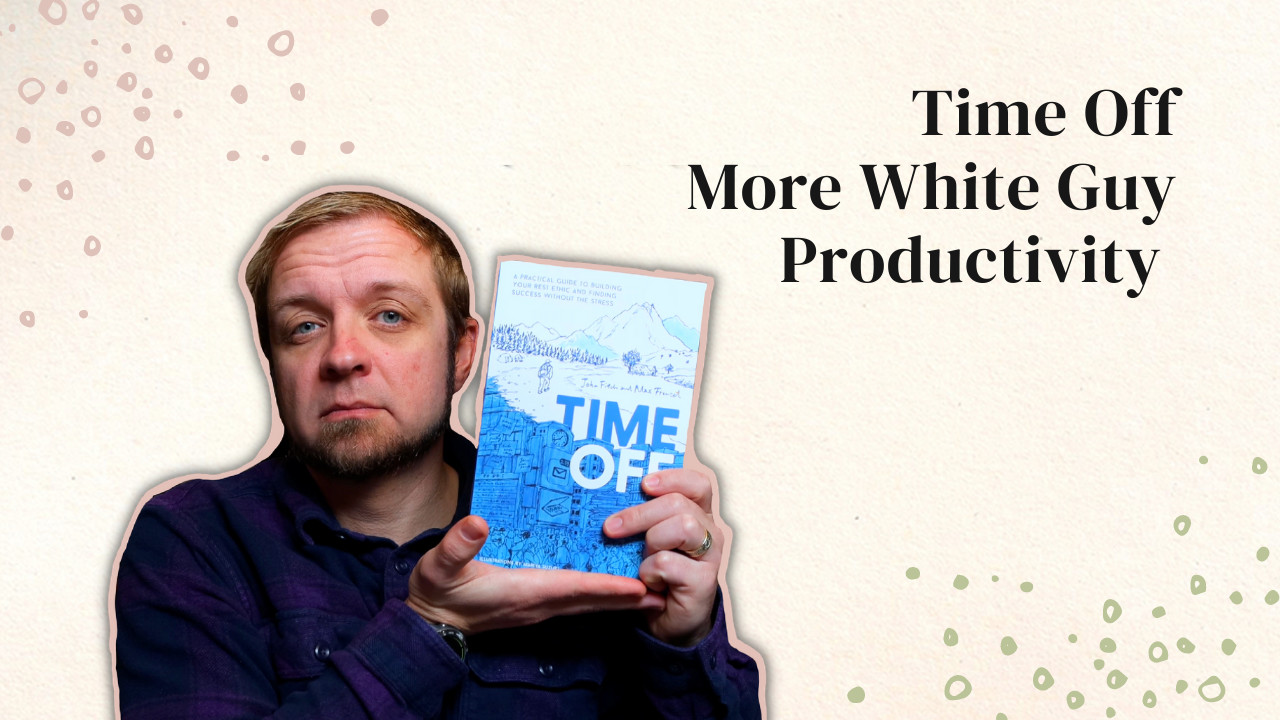Many of us would love to have more time off for ourselves, at least we say that’s what we’d like. The truth is a bit more complex than that, in that produce far more than generations past, but get paid less for it and work longer hours.
Part of this is addressed in Time Off by John Fitch and Max Frenzel. This book is intended to help us develop practices of noble leisure1 so that we can live a life without overwork2.
Before we dive into the book, let’s define noble leisure. According to the authors, we work for a utilitarian goal. We earn money or accomplish something. Conversely, noble leisure is done just for itself and requires no other outcome or validation. We do noble leisure activities simply because we want to do them. In my life, noble leisure would be coaching the cross-country team at the school across the street.
One other point the authors hang their book on is that you need a rest ethic as strong as your work ethic3. If you want to be able to work hard, you should rest “hard” as well. This is because in a knowledge economy the quantity of your hours working has less to do with what you produce than the quality of the time you spend working4.
Rest by Alex Soojung-Kim Pang also examined how poor we are at resting as individuals.
How Did Leisure Become Bad?
Time Off opens with an examination of how leisure time turned from something that people aimed for in the 1930s to something we look at as a bad thing. In the 1930’s5 or in Greek and Roman times6, if you had leisure you were seen as successful. Now we look at someone with too much leisure as lazy.
The authors say that this switch mainly happened during the Industrial Revolution when people stopped trading finished goods and started selling their own hours as production time. Once you stop selling finished goods and start selling hours, each hour you don’t sell is lost income7. When they’re purchasing time employers also want to wring every ounce out of you during the hours they purchased8.
While this was more possible when you spent the day being physically active, we only have 5 – 6 hours of good productive hard thinking brainpower in us. Asking for 8 hours of productive thought work daily is asking for water from a rock.
When we looked at Rest we saw that when many of us work in complex open-ended projects it’s hard to measure output. Thus we use hours as a proxy for productivity because it’s easy for bosses to measure. This leads many people to simply use busyness as a proxy for productivity9. Looking at busyness as a proxy for productivity is merely a way to look productive and mask how ineffective much of the processes we use at jobs are.
The Rest of the Book
After trying to establish a baseline understanding of where our leisure time went the authors move on to trying to help you explore what more leisure would provide in different areas of your work and life. Let’s take a look at a few of these areas.
On Rest
While many people look at rest as something you do with little relation to work, the authors look at rest as integral to being creative10. Good rest is good incubation time for ideas where your default mode network10 gets to process ideas without you being conscious of it.
They equate good rest to crop rotation, you can’t keep extracting the same thing from the same place unless you want to exhaust the supply. Without adequate rest you’re exhausting the supply of good thinking you can do11.
On Sleep
While sleep may be considered the same as rest, Fitch and Frenzel tackle it on its own. They highlight that we are all different chronotypes, which means we each do better waking up at different times of the day. Some people get up early and succeed then, while others do better later in the day.
If you want to dig deeper into chronotypes and timing events then look at When by Daniel Pink.
The point the authors are trying to make is that you should know yourself and work to adjust your schedule to suit when you do your best work. Unfortunately, society pushes most of us into the same pattern regardless of when we would produce the best work.
They also tackle the idea that because we fall into busyness as a proxy for productivity lie, we often work long past when we are producing anything of value12. Instead of reaping the rewards of sleep, which has been shown to increase performance by as much as 10% if you get good sleep consistently, we sit down and just keep plugging away13.
I know I do this while running my business sometimes. I’ll be feeling totally spent by 2 pm after a good day writing, but stay in the office pushing things forward just because I should be working. Sometimes my brain wins the battle and I just go sit with a book or take a walk without feeling guilty about leaving the office “early”.
On Subtraction
Another excellent idea Fitch and Frenzel tackle is that there are two ways to improve your life. You can either add or subtract things from what you have to do14. Most of us default to addition, we always want to take on another thing because we have bought in the busyness as productivity lie.
From this, I often think of one of my many posts on how saying no is so good for you, though Derek Sivers gets more notice for his Hell Yes or No book.
Basically, if you’re not so excited about doing something that you can’t say no to it, you shouldn’t be doing it at all. Don’t get stuck in middling priorities, those things fall outside your top 3 tasks but inside the top 20. Those tasks steal your time and fool you into thinking that you’re getting good work done.
On Technology
When it comes to technology the authors cover some ground that has been covered before in Digital Minimalism and The Shallows.
In short, is your technology serving you, and what do you think is most important in your life15? This idea is one of the reasons I like working on an iPad, the windowing environment simply feels more focused and productive. When set up properly, it’s much harder to be distracted on my iPad.

Getting Started with Zettelkasten
If you’ve been wondering about what Zettelkasten is and how to start organizing your notes with this excellent system then this course is for you. I’ll walk you through how I use this system to develop my reading research for posts like this one here. You can also become a member to get all my courses.
$99 USD (30-day guarantee)
Take a minute to evaluate the technology and services you use. Make sure you use them for things that further your goals, not for the reasons tech companies want you to. They’re merely trying to steal all your attention, and you have better things to do with it.
Societies Rules are Old
One great point the authors make is that many systems we live with and take as written in stone are merely some idea someone had that we haven’t changed yet. Many of these ideas were inspired hundreds of years ago when they caught on, and have no bearing on the world we live in today16. They extend this line of reasoning to cover the current standard 8-hour workday.
Are we sticking with this 8-hour day because at the moment it’s easier to keep going than to stop and evaluate the efficacy of the plan in the first place?
What are you doing today that should be stopped because it’s a waste of your time given the circumstances you live in.
But the Book Fails Big
The book ends with a long discussion on the future of work. It examines how artificial intelligence is going to replace jobs and we won’t need to work so much. But that supposes resources will be shared fairly between everyone. As it stands during COVID the rich got richer while those at the bottom end of the income bracket struggled. In part, this happens due to the lack of strong social safety nets in some countries. Most “life-hacks” are all about rich white dudes whose day-to-day life has no resemblance to anyone reading the supposed productivity tip.
Here in Canada, they rolled out CERB for those that were unable to work. My wife’s job was closed for months but the payment of $2000/month meant we didn’t have to worry. We’re also very lucky that my income is not location dependant. I kept working out of my office without really missing a beat.
So if like Time Off contends, we’re going to need to work less how do people still have an income of note? Does this mean that we need to roll out Universal Basic Income? The authors provide no direction on this point. It would seem they figure stuff will just work out and no overall change in society is required to make sure that people can still live with dignity.
Should You Read Time Off?
While I found a bunch of decent advice in the book, I’m having a hard time getting past the fact that the authors didn’t address how to handle income as work decreases. It’s fine to say that we should work less, but will employers pay us the same amount for fewer hours? Will society do more to value the dignity of everyone and support them no matter what?
Even in Canada that has a decent social safety system, we don’t pay for lots of medical things that reduce the longevity of our population. We don’t have free daycare, so working parents that don’t work at home have to miss shifts or scramble to deal with school closures. The stress this lack of support has on families is huge.
I guess I’m giving this a tentative yes on the read, just don’t forget the glaring omission of how on earth they propose society as a whole handles their predicted future of less work.
